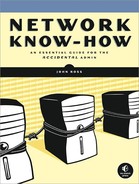The simplest kind of computer network is no network at all. If you have been working with multiple computers without a network, you know the routine: Every time you need something from a different computer, you have to store a file on a floppy disk, a portable drive, or a flash drive, physically carry it from one computer to another, and load the file onto the second computer. Sometimes you'll take the file from the computer you were originally using to the one that is connected to the right printer. If you've been writing a paper on a laptop computer, you might want to add an image that's stored on the desktop system's hard drive. Or maybe you want to give a copy to a colleague for review or approval. Whatever the reason, you have to carry a copy of one or more computer files from one machine to another.
This usually involves some walking, so the process is often known as sneakernet. The name reflects the informal dress common in most computer centers, but if you and your family dress for dinner every evening, or if you're a slave to fashionable footwear, you can think of it as "Oxfordnet" or "Slingbacknet" or "Espadrillenet" instead. Whatever you choose to call it, physically carrying files from one place to another is often a distracting, time-consuming nuisance.
However, sneakernet does have its uses. When you travel, it can often be easier and more convenient to carry a few files with you rather than retrieve them from a distant computer through the Internet. If you plan to use computers in two or more locations, such as one at school and another at home, you might be better off storing the file on a small portable drive instead of hauling your laptop around.
When security is an important issue, you might not want to connect your computer to any network. The very best way to protect your confidential data from theft through a network is to make sure the computer where the data is stored has no network access.
Sneakernet is not always the slowest way to move data from one computer to another. If you want to move a lot of data over a relatively short distance when you don't have a high-speed data connection, it can often be faster to drive a handful of DVDs or a box of tapes across town than to send the same files through a dial-up connection or any other slow network link. It's one of the oldest maxims in the world of computers and networks, but it's still true: Never underestimate the bandwidth of a station wagon full of floppy disks.
